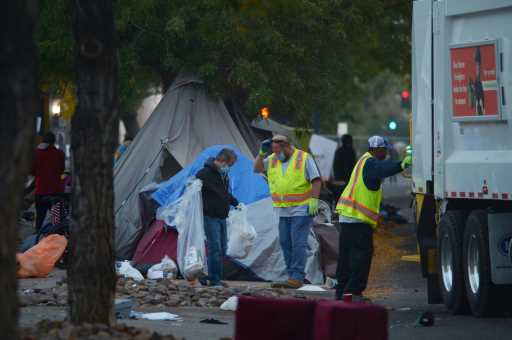Denver’s practice of clearing encampments of unhoused people has been the subject of lawsuits, protests and a failed 2019 ballot measure seeking to repeal the city’s camping ban.
Initiated Ordinance 303 on the Nov. 2 ballot would build on the camping ban, opening the city to more lawsuits if it doesn’t enforce the ban under a strict timeline.
If passed, the ordinance, brought forth by Denver Republican Party chair Garrett Flicker, would do the following:
- Mandate that you must have written permission for camping on private property
- Set a three-day deadline for the city to take action against campsites after receiving a complaint
- Allow people to sue the city if it doesn’t meet the three-day rule
- Cap the number of city-sanctioned campsites at four, requiring running water, restrooms and lighting at each
“I love Denver and think it can be a great city again, but we must compassionately and fairly address the serious, and virtually out of control, homeless problem in our city,” Flicker said in an email to The Denver Post. “Our measure is simple, common-sense, compassionate and fair.”
City officials don’t see it that way. Neither do advocates for people experiencing homelessness. Both the City Council and Mayor Michael Hancock are opposed to 303.
The council passed a proclamation last week, calling out the dark money behind the signature-gathering effort and warning voters that the lawsuit provision could put taxpayers on the hook for painful payouts. As highlighted in a Westword story in June, Defend Colorado, a group that doesn’t disclose its donors, gave the 303 committee $80,000 in May. The group donated another $37,500 in June, campaign finance records show.
“A lot of things about encampments are illegal today. Camps are being cleaned up every day in Denver. That’s not what this initiative is about,” Councilwoman Robin Kniech said at the Oct. 4 council meeting. “It’s about massive taxpayer liability.”
Hancock said the measure seems to have been crafted without an understanding of the legal framework the city has to operate under when addressing camps. A federal judge has ordered the city to provide seven days’ notice before clearing an encampment, something that would override a shorter timeline that 303 would establish.
Flicker called that argument disingenuous because he believes delivering a warning would count as enforcement.
He also defended the provision that would cap the number of sanctioned camping sites at four. The city already has two, and Hancock said he hears from groups across the city that are interested in setting up others.
“The city has shown that it is having a huge challenge to handle this problem,” Flicker wrote in an email. “So my view was that four sites – with the basic services that we’re requiring such as running water, toilets and lighting – was a number that the city can competently handle.
Money to pay for the campsites and enforcement of the three-day rule would have to come from the city’s existing revenue stream. The city’s ballot guide estimates that operating one safe outdoor camping site and responding to complaints within three days under the rules of Initiated Ordinance 303 would cost between $5.08 million and $6.58 million per year.
Andy McNulty, the attorney who brought the lawsuit against the city’s camping ban, said the city and advocates for the unhoused make strange bedfellows in opposing Ordinance 303 but that the measure is so over the line it requires it.
He noted that there is no probable cause or due process outlined in the ordinance, so if someone complains about camping, the city must act.
“This is another tool that is going to be used to criminalize unhoused folks and do so in a way that is completely unprecedented in our legal system,” McNulty said. “I can tell you this: It is a near certainty that if this measure passes there will be a lawsuit filed against it; a civil rights lawsuit saying it is unconstitutional.”
Source: Read Full Article
